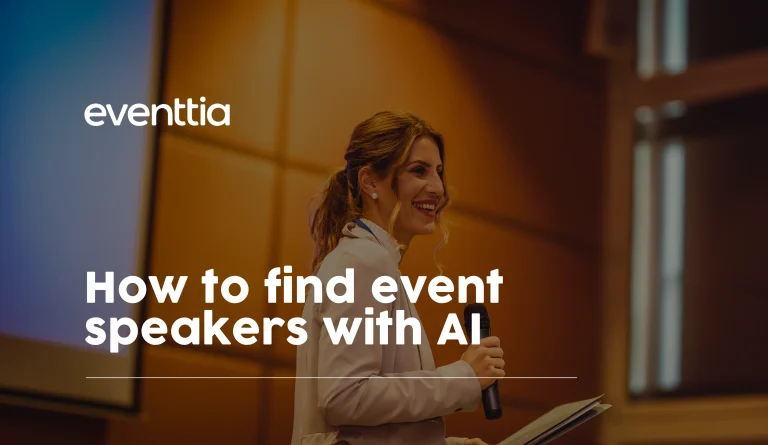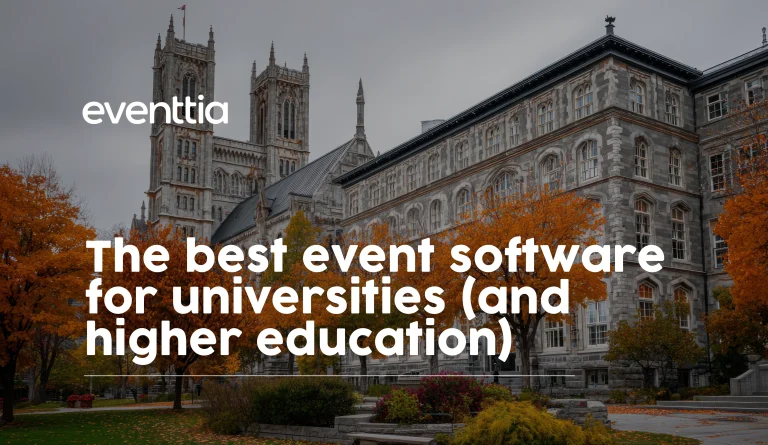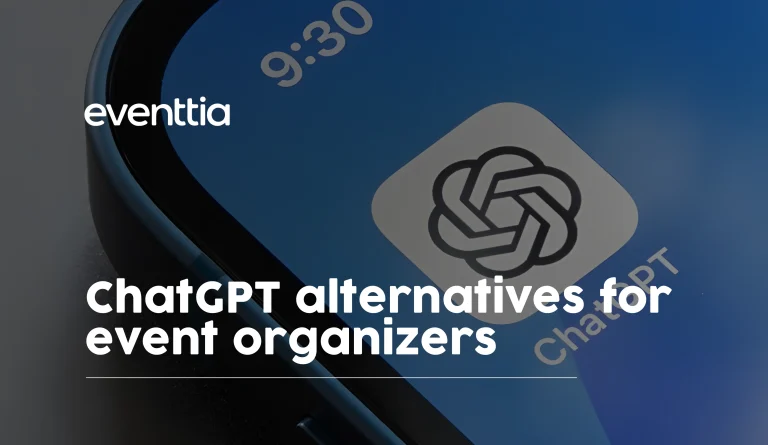Finding the right speaker can make or break an event. The right keynote or panelist sets the tone, engages your audience, and drives lasting impact. But the process of discovering, evaluating, and securing speakers can be time-consuming and resource-heavy.
AI is changing that. With the right approach, event professionals can use AI to streamline every stage of the speaker selection process, from research and outreach to logistics and post-event evaluation. This guide will show you how.
Why use AI to find event speakers?
Event planners and organizers often face challenges when sourcing speakers:
- Time constraints: Researching hundreds of potential candidates manually is overwhelming
- Audience fit: Not every speaker is the right match for your event’s goals and demographics
- Logistics: Coordinating availability, travel, and content preparation adds complexity
AI tools can help you:
- Generate curated lists of potential event speakers
- Evaluate credentials and past performance
- Automate outreach and communication
- Prepare better interview questions
- Support speakers with logistics and content
- Gather actionable feedback after the event
Combined with event management platforms like Eventtia, AI enhances speakers research, saving hours of work and delivering more impactful events.
Step 1: Use AI to research and generate a speaker shortlist
AI can act as your research assistant, scanning websites, LinkedIn profiles, past event agendas, podcasts, and industry articles to identify potential speakers. Instead of manually compiling a list, you can use AI to build an initial pool of candidates.
Tools you can use for speaker research
- ChatGPT or similar AI assistants: Great for compiling broad lists based on prompts.
- LinkedIn Sales Navigator with AI support: Helps filter professionals by industry, role, and geography.
- Speaker bureau databases enhanced with AI search: Many bureaus now use AI to recommend speakers based on event themes.
- Predictive analytics platforms: These tools analyze who is trending in your industry and who audiences are engaging with online.
Example AI prompt for research
You can use a basic prompt like “Find 10 speakers in the healthcare industry,” but it will give you a very generic response. The more detailed your prompt is, the more likely you are to get a curated, relevant list that’s designed for your audience.
You are an event planner tasked with finding keynote speakers for [EVENT NAME], an event about [TOPIC]. The audience will consist of [AUDIENCE DEMOGRAPHIC].
Please provide a list of 15 potential speakers who:
- Have recognized expertise in [TOPIC]
- Have spoken at conferences, panels, or webinars before
- Match the audience profile (e.g., executives, students, entrepreneurs)
- Spoken language: American English
Diversity criteria: Select diverse candidates in terms of gender and age.
For each candidate, include:
- Full name
- Current role and organization
- Main area of expertise
- Notable past speaking engagements
- Links to videos, articles, or online profiles
With tools like ChatGPT or similar AI assistants, this kind of structured prompt gives you an actionable starting list. From there, you can refine based on your event goals.
Narrowing down your list
Once you have results, you can ask AI to filter candidates based on:
- Expertise: Does their specialty align with your event theme?
- Speaking fee range: Stay within budget early
- Location and language: Important for international events
- Audience fit: Will their tone and examples resonate with executives, students, or other groups?
By using layered prompts and filters, you save hours of manual research and begin with a curated, targeted pool of candidates.
Pro tip: To facilitate your research, save time and improve results, use the AI Assistant from Perplexity.ai, integrated within the web browser called COMET
Step 2: Evaluate credentials and past performance
Once you have a list of potential speakers, the next step is assessing who best fits your event. Here’s how AI helps:
- Analyze online content: AI can summarize a speaker’s blog posts, videos, and social media presence to highlight their communication style.
- Check credibility: By scanning citations, media mentions, and peer recognition, AI helps you identify thought leaders versus self-promoters.
- Match to event goals and audience: AI tools can rank speakers by relevance to your event themes and audience.
Using AI for speakers video and performance analysis
Some AI tools can review video recordings of past talks to assess:
- Tone and clarity: Was the presentation easy to follow?
- Engagement: Did the speaker vary voice, pace, and gestures effectively?
- Audience reaction: Tools with sentiment analysis can gauge crowd response through facial expression or applause levels
Predicting audience fit
AI can compare a speaker’s content with your attendee profiles (from platforms like Eventtia). This helps predict:
- Which topics will resonate most strongly
- Whether the speaker’s level of technical detail is appropriate
- If their style matches your audience’s preferences (e.g., formal vs. informal)
Quick checklist before outreach
Ask AI to generate a checklist to confirm speaker suitability. For example:
- Does the speaker have at least 3–5 prior speaking engagements?
- Are there positive reviews, testimonials, or press mentions?
- Does their expertise align with your core event theme?
- Are they comfortable with your chosen format (keynote, panel, workshop)?
- Do they fit within your budget and logistics?
Pro tip: Combine AI analysis with Eventtia’s attendee management tools. By cross-referencing speaker expertise with your attendee profiles, you can predict which speakers will resonate most.
Step 3: AI-assisted outreach and communication
After shortlisting, the next step is inviting speakers. Crafting personalized, professional emails is crucial. AI can draft messages tailored to each candidate’s background.
Example AI prompt for outreach email:
You are an event planner inviting a speaker.
Draft a professional, engaging email to [SPEAKER NAME], who is an expert in [FIELD]. The event is [EVENT NAME], taking place on [DATE] in [LOCATION].
The audience includes [AUDIENCE PROFILE].
Key points to include:
- Why they were chosen
- What value they would bring to the audience
- Event details (date, location, audience size)
- Logistical support (travel, accommodation covered if applicable)
- A clear call to action: confirm interest or schedule a quick call
Keep the email concise and respectful.
Example AI-crafted email:
Subject line: Invitation to Speak at [Event Name]
Dear [Speaker Name],
I am reaching out on behalf of [Organization] to invite you as a keynote speaker at [Event Name], taking place on [Date] in [Location]. The event will bring together [Audience Profile] to explore [Theme].
Your expertise in [Field] and your past work on [Specific Topic or Achievement] would provide exceptional value to our audience. We would be honored to feature your insights as part of our program.
We will provide full logistical support, including travel and accommodation, and are happy to discuss honorarium arrangements.
Would you be open to a short call to discuss the opportunity further?
Warm regards,
[Your Name]
[Your Organization]
Remember, AI isn’t always accurate, so always double-check the output to make sure you’re sending correct information to your invited speakers.
Step 4: Interviewing and vetting potential speakers
Even the most impressive CV or video reel does not guarantee a strong live performance. That’s why meeting or interviewing your shortlisted speakers is essential. It helps you:
- Assess communication style and audience engagement
- Confirm alignment with event themes
- Discuss expectations, format, and logistics
AI can help here by generating tailored interview questions.
Example AI prompt for interview questions
You are an event organizer preparing to interview a potential keynote speaker for [EVENT NAME]. Generate a list of 12 thoughtful questions that will help assess:
- Speaking style and ability to engage a live audience
- Expertise and alignment with event themes
- Comfort with different formats (keynote, panel, Q&A)
- Availability and logistical flexibility
- Ideas for tailoring their talk to the audience (describe audience: [AUDIENCE PROFILE])
This approach ensures you cover both practical and creative angles during the vetting process.
Step 5: Using AI to support speaker logistics
Once speakers are confirmed, the next challenge is coordination. You can use AI to help you streamline the logistics, in terms of:
- Scheduling: AI can generate conflict-free schedules by analyzing the availability of your speakers and comparing that to your event itinerary.
- Travel and accommodation: AI tools can suggest optimal travel routes, book hotels, and create itineraries for guest speakers.
- Reminders and communications: You can use AI to automate reminders for deadlines, presentation submissions, or rehearsals.
With some help from AI, you can minimize the amount of time you’re spending on event logistics, freeing your team up for the more strategic elements of organizing your event.
Step 6: AI for speaker presentation material
Your speakers may already have an idea of what they want to present or talk about, but it’s always a good idea to provide some suggestions to make sure they’re focusing on topics that will bring value to your attendees. You can use AI to help with:
- Content review: AI can review slide decks for clarity, grammar, and tone consistency
- Audience adaptation: Use AI to adjust technical depth for different audience levels
- Visual support: AI design tools can enhance slides with professional graphics and layouts
Example: If your audience includes non-native English speakers, AI tools can simplify complex terminology for better accessibility.
Step 7: Gathering feedback and post-event insights
Feedback (like post-event surveys) is crucial for improving future events and assessing speaker performance. You can use AI for:
- AI-generated surveys: Quickly create post-event feedback forms with relevant questions.
- Sentiment analysis: AI can analyze open-text responses to identify trends in audience satisfaction.
- Breakout topic suggestions: Based on responses, AI can suggest new themes for future sessions.
When integrated with Eventtia, this data connects back to attendee profiles, helping you continuously refine speaker selection.
Other ways AI enhances the speaker process
AI can support speaker management in many ways beyond the core steps of research, evaluation, and outreach. Here are some additional opportunities:
Diversity and inclusion
AI can help event planners build a diverse and inclusive speaker lineup by analyzing demographic data, professional backgrounds, and subject matter expertise across proposed speaker lists. It can flag imbalances, such as an overrepresentation of certain regions or genders, and suggest alternative candidates to improve balance. Over time, AI can also compare your current lineup with past events, helping you measure progress toward inclusivity goals.
Budget optimization
Speaker fees often represent a significant portion of event budgets, and they vary widely depending on industry, reputation, and demand. AI can analyze historical data, public appearances, and market trends to estimate expected fees.
It can also model the potential audience draw or ticket sales increase linked to certain high-profile speakers. By comparing projected event ROI across different candidates, planners can make more confident financial decisions and ensure that speaker selections align with their overall event objectives.
Content marketing opportunities
A strong speaker can deliver value long after the event ends, especially when paired with AI-driven content repurposing. Recorded talks, interviews, or Q&A sessions can be automatically transcribed, summarized, and turned into blogs, reports, or e-books.
Video content can be clipped into short, engaging highlights for social media, while audio can be repackaged into podcast episodes. This not only extends the life of the event but also maximizes visibility for both the speaker and the organizer.
Real-time audience engagement
During the event itself, AI tools can boost interactivity and help speakers connect with audiences in more dynamic ways. Real-time sentiment analysis can provide insights into how well the audience is responding to a session, allowing for adjustments in pacing or delivery.
AI can also generate live polls, quizzes, or Q&A prompts to foster engagement. For international events, real-time translation and captioning ensure accessibility for multilingual audiences.
Post-event knowledge management
The value of great speakers should continue long after the event concludes. AI can automatically organize recordings, transcripts, and presentation materials into searchable libraries for attendees or internal teams. It can highlight recurring themes across sessions, which can be used to guide the content strategy of future events.
Final thoughts
AI is transforming how event organizers discover, evaluate, and manage speakers. By combining AI tools with event management software like Eventtia, you can:
- Save time on research
- Improve audience-speaker alignment
- Communicate more effectively
- Reduce logistical challenges
- Gather actionable feedback for future events
It can help you build stronger programs, more engaged audiences, and events that deliver real value.
If you want to simplify your event workflows, integrate AI insights, and manage every aspect of your event from one place, Eventtia is the platform for you. From speaker management to attendee engagement, Eventtia provides the tools you need to run smarter, more successful events.
Schedule a demo with Eventtia today and see how AI-powered event management can transform your next conference or summit.
FAQs
Can AI completely replace human judgment in selecting speakers?
No. AI is a powerful tool for research, analysis, and suggestions, but final decisions should always involve human judgment. Factors like personality fit, event culture, and nuanced audience needs require organizer input.
How accurate are AI-generated speaker recommendations?
Accuracy depends on the quality of data available. AI works best when it has access to reliable speaker information, event goals, and attendee profiles. Always double-check findings with manual research and interviews.
Will using AI make the process less personal when reaching out to speakers?
Not if used correctly. AI can draft professional, personalized emails, but organizers should review and tailor them before sending. This ensures outreach feels authentic and aligned with the event’s brand voice.
Can AI help with international or multilingual speakers?
Yes. AI can assist with translation for communications, real-time captioning during sessions, and even adapting promotional content for different regions. This makes it easier to work with speakers from diverse backgrounds.
How does AI integrate with event management platforms like Eventtia?
AI can complement Eventtia by feeding insights into its speaker, attendee, and scheduling tools. For example, AI can suggest the best speaker matches for your audience, while Eventtia ensures logistics, budgeting, and communication run smoothly.
Is AI cost-effective for smaller events?
Yes. Many AI-powered research and content tools are affordable and scalable. Even small events can benefit from AI’s ability to speed up research, create polished outreach, and generate repurposed content from speaker sessions.
How can AI improve post-event speaker evaluation?
AI can analyze attendee feedback, social media mentions, and session recordings to highlight what worked well and where improvements are needed. This data is invaluable for selecting and improving future speaker lineups.
Discover how Eventtia helps world-leading brands digitize and scale their events
Learn moreShare




